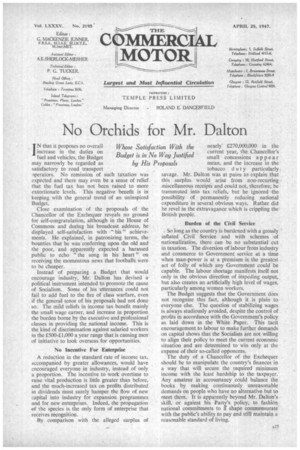No Orchids for Mr. Dalton
Page 25

If you've noticed an error in this article please click here to report it so we can fix it.
IN that it proposes no overall increase in the duties on fuel and vehicles, the Budget may narrowly be regarded as satisfactory to road transport operators. No remission of such taxation was expected and there may even be a sense of relief that the fuel tax has not been raised to more extortionate levels. This negative benefit is in keeping with the general trend of an uninspired Budget.
Close examination of the proposals of the Chancellor of the Exchequer reveals no ground for self-congratulation, although in the House of Commons and during his broadcast address, he displayed self-satisfaction with " his " achievements. He explained, in patronizing terms, the bounties that he was conferring upon the old and the poor, and apparently expected a harassed public to echo the song in his heart" on receiving the momentous news that footballs were to be cheaper.
Instead of preparing a Budget that would encourage industry, Mr. Dalton has devised a• political instrument intended to promote the cause of Socialism. Some of his utterances could not fail to add fuel to the fire of class warfare, even if the general tenor of his proposals had not done so. The mild reliefs in income tax benefit mainly the small wage earner, and increase in proportion the burden borne by the executive and professional classes in providing the national income. This is the kind of discrimination against salaried workers in the C5004.1,000 a year range that is causing men of initiative to look overseas.for opportunities.
No Incentive For Enterprise A reduction in the standard rate of income tax, accompanied by greater allowances, would have encouraged everyone in industry, instead of only a proportion. The incentive to work overtime to raise vital production is little greater than before, and the much-increased tax on profits distributed in dividends must surely hamper the flow of new capital into industry for expansion programmes and for new enterprises. Indeed, the propagation of the species is the only form of enterprise that receives recognition.
By comparison with the alleged surplus of nearly £270,000,000 in the current year, the Chancellor's small concessions appear mean, and the increase in the tobacco duty particularly . savage. Mr. Dalton was at pains to explain that this surplus would arise from non-recurring miscellaneous receipts and could not, therefore, be transmuted into tax reliefs, but he ignored the possibility of permanently reducing national expenditure in several obvious ways. Rather did he revel in the extravagance which is crippling the British people.
Burden of the Civil Service , So long as the country is burdened with n grossly, inflated Civil Service and with schemes of nationalization, there can be no substantial cut in taxation. The diversion of labour from industry and commerce to Government service at a time when man-power is at a premium is the greatest act of folly of which any Government could be capable. The labour shortage manifests itself not only in the obvious direction of impeding output,, but also creates an artificially high level of wages, particularly among women workers.
The Budget suggests that the Government does not recognize this fact, although it is plain to • everyone else. The question of stabilizing wages is always studiously avoided, despite the control of profits in accordance with the Government's policy as laid down in the White Paper. This tacit encouragement to labour to make further demands on capital shows that the Socialists are not willing to align their policy to meet the current economic situation and are determined to'in only at the expense of their so-called opponents.
The duty of a Chancellor of the Exchequer should be to manipulate the country's finances in a way that will secure the required minimum income with the least hardship to the taxpayer. Any amateur in accountancy could balance the books by making continuously unreasonable demands on people who have no alternative but to meet them. It is apparently beyond Mr. Dalton's skill, or against his Part's policy, to fashion. national commitments to a shape commensurate' with the public's ability to pay and still maintain a reasonable standard of living.












































































